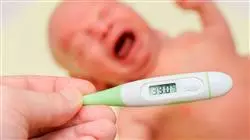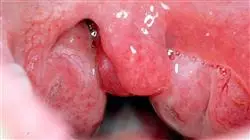University certificate
The world's largest faculty of nursing”
Description
Expand your knowledge in the management of patients with Infectious Diseases who come to the Emergency Department and provide greater safety in your interventions"

The nursing professional's performance in the Emergency Department is a complex task, as in other specialties, since the worker is outside a specialized unit. Thus, when you encounter cases of infectious pathologies, your intervention may be more complex than usual. For this reason, it is essential for these professionals to have educational tools that allow them to specialize in their main areas of activity.
In this case, TECH offers a complete training oriented to specialize nurses in Infectious Diseases that affect children and that, due to their complexity or because they have symptoms that can be harmful to children, end up being treated in Emergency Departments. Thus, the program includes the classic aspects in the management of infectious pathology by apparatus or organs, as well as new items essential for a correct management of Infectious Diseases in the current scenario of globalization of health. But, as it could not be otherwise, the main content is aimed at knowing the main Infectious Diseases that affect children in order to know the best way to take care of them. The fact is that the complexity that can be involved in urgent action in pediatric patients with infectious diseases requires a high level of specialization in order to train health care professionals.
On the other hand, being a 100% online training, the professional will have the ability to decide when and from where to study, without commitments or obligations, thus being able to combine their study time with the rest of their daily obligations.
We offer you a complete specialization on Infectious Diseases in children to improve your training in the care of your patients"
This postgraduate diploma in Infectious Diseases in the Emergency Department of the Pediatric Patient for Nursing contains the most complete and up-to-date scientific program on the market. The most outstanding features of this program are:
- The development of clinical cases presented by experts in Infectious Diseases in the Pediatric Patient
- The graphic, schematic, and eminently practical contents with which they are created provide scientific and practical information on the disciplines that are essential for professional
- Therapeutic developments on the intervention in Infectious Diseases
- Practical exercises where to carry out the self-assessment process to improve learning
- An algorithm-based interactive learning system for decision-making in the clinical situations presented throughout the course
- Its special emphasis on research methodologies
- Theoretical lessons, questions to the expert, debate forums on controversial topics, and individual reflection assignments
- Content that is accessible from any fixed or portable device with an Internet connection
This specialization will train you for the appropriate treatment in the different cases of infectious pathology"
Its teaching staff includes professionals from the nursing field, who contribute their work experience to this training, as well as renowned specialists from leading scientific societies.
The multimedia content, developed with the latest educational technology, will provide the professional with situated and contextual learning, i.e., a simulated environment that will provide an immersive training experience designed to train for real-life situations.
The design of this program focuses on Problem Based Learning, by means of which the nurse must try to solve the different professional practice situations that arise throughout the academic year. For this purpose, the professional will be assisted by an innovative interactive video system developed by recognized experts in the field of Infectious Diseases in Pediatric Patients with extensive teaching experience.
A 100% online training that will allow you to study from anywhere in the world. All you need is a computer or mobile device with an internet connection"

Take the opportunity to learn about the latest advances in Infectious Diseases in Pediatric Patients and improve the care of your patients"
Objectives
The postgraduate diploma in Infectious Diseases in the Emergency Department of the Pediatric Patient for Nursing is aimed at facilitating the performance of nurses dedicated to the treatment of urgent infectious pathology in all areas, but especially in the Emergency Department.

Do not miss the opportunity to study at the best university and achieve the goal of obtaining quality training"
General Objectives
- Provide the necessary theoretical knowledge to be able to understand the environment in which the professional activity is developed to care for patients with Infectious Diseases
- Provide the appropriate treatment in the different cases of infectious diseases
- In-depth study of each of the areas in which professionals must be trained to be able to practice with knowledge in the care of infectious pathologies
Specific Objectives
Module 1. Update on Infectious Diseases
- Define virulence factors and toxins
- Identify the main human pathogens in our environment
- Explain the different current scenarios of infection in the Emergency Department
- Describe the etiopathogenic profiles of bacterial infections
- Describe the etiopathogenic profiles of viral infections
- Describe the etiopathogenic profiles of fungal infections
- Describe the etiopathogenic profiles of microbacterial infections
- Describe the etiopathogenic profiles of parasitic infections
Module 2. The Microbiology Laboratory in the Emergency Department
- Describe the process of collecting specimens
- Define which specimens are most commonly requested in the Emergency Department
- Explain the collection of specimens in patients with devices
- Describe the management of specimens in the laboratory
- Explain the clinical significance of bacterial resistance
- Define the techniques available for emergency diagnoses
- Describe the interpretation of preliminary results
- Explain the analytical interpretation of the different types of samples
- Define the procedures in hospitals without on-call microbiologists
- Explain the diagnostic techniques that can possibly be performed in the emergency department laboratory
Module 3. Public Health and Infectious Disease in the Emergency Department
- Describe the action protocols in cases of specific exposure
- Describe the established isolation protocols
- Explain the current indications of exclusion or isolation
- Describe notifiable diseases
- Explain the procedure for emergency declaration to Public Health
- Describe the action protocol for epidemiological outbreaks
- Describe imported pathology, as well as pathology with high contagious capacity
- Describe the seasonal epidemiological parameters in the most common infections in the community
- Explain epidemic outbreaks and common sources with punctual, continuous, propagative and mixed exposure
- Define the post-exposure prophylaxis that is initiated in the emergency department
- Describe the process to follow in the case of Bacterial Meningitis
- Describe the process to follow in the case of HIV Infection
- Describe the process to follow in the case of Sexual Assault
- Describe the process to follow in the case of Rabies
Module 4. Infectious Diseases in the Emergency Department of the Pediatric Patient
- Describe the management of fever syndrome and exanthems in a pediatric patient in the Emergency Department
- Explain the emergency diagnosis and treatment of skin, soft tissue and skeletal system infections in pediatric patients
- Explain the emergency diagnosis and treatment of ENT and respiratory infections in pediatric patients
- Explain the emergency diagnosis and treatment of gastrointestinal, genitourinary and STI infections in pediatric patients
- Explain the emergency diagnosis and treatment of the central nervous system and cardiovascular infections in pediatric patients.
- Explain the therapeutics in pediatric infectious diseases

Update your knowledge through the program on Infectious Diseases in the Emergency Department of the Pediatric Patient for Nursing"
Postgraduate Diploma in Infectious Diseases in Pediatric Patient Emergencies for Nursing
Pediatric ED infectious diseases represent a constant challenge for Nursing professionals. These conditions require prompt and efficient care to ensure the well-being of the youngest patients. In this context, it is essential that nurses are trained to recognize, assess and adequately manage these types of diseases. Based on this, TECH Global University has developed its Postgraduate Diploma in Infectious Diseases in Pediatric Patient Emergencies for Nursing. An online postgraduate course created with the highest academic standards that will complement your studies in a dynamic and flexible way. In the syllabus, carefully designed by a team of experts, you will find relevant aspects such as acute respiratory infections and skin infections, followed by vector-borne diseases and gastrointestinal infections.
Manage infectious diseases in the pediatric patient's emergency department.
The objective of this Postgraduate Diploma is to provide you with the necessary tools to efficiently identify, evaluate and treat the most common infectious diseases in children attending emergency departments. Throughout the Postgraduate Certificate, you will acquire the theoretical knowledge and practical skills necessary to provide quality care to these patients. Likewise, you will learn to recognize the characteristic signs and symptoms of each disease, perform a rapid assessment and apply the appropriate treatments according to current clinical guidelines. Upon completion of this Postgraduate Certificate, you will be prepared to meet the challenges associated with infectious diseases in the pediatric emergency setting. You will obtain the necessary skills to provide comprehensive and quality care to patients, thus contributing to the well-being of the pediatric population.







